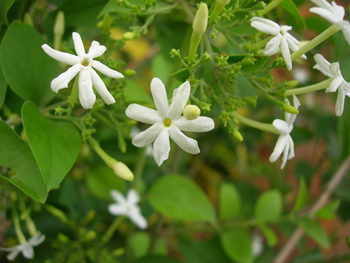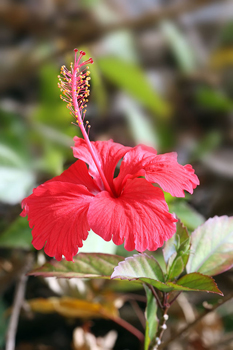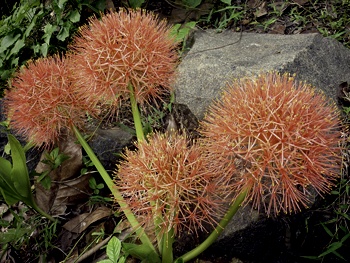Secret Flowers
By Debie Thomas
 |
My grandmother used to be a secret gardener. She was a young wife and mother at the time, married to a neat, methodical gentleman-farmer in South India. Every year, my grandfather would plant the family garden with care. He'd count out his seeds, measure his distances, and plant a modest number of herbs and vegetables in spare rows.
Every year when he was finished, my grandmother would return to the garden in secret, her fists full of seeds, and plant a riot between my grandfather's orderly rows. Her growing kids' appetites ever on her mind, she would plant more string beans, more peppers, more tomatoes, more carrots. Her love for color and fragrance too powerful to suppress, she'd plant jasmine, hibiscus, geraniums, and marigold. Ever an experimenter, if she spotted an interesting plant in a neighbor's garden, she'd ask for a cutting, and sneak that into the mix, too.
I'm not sure if my grandfather ever figured out why his well-disciplined garden went abundantly wild each year. Maybe he noticed, maybe not. The kids noticed -- that I know for sure; it was my mother who told me this story several years ago. Even now, it's the story I cherish most about my grandmother.
Here's another, darker story I learned more recently. When my grandmother's youngest daughter was two years old, the baby toddled into the kitchen, took hold of a kettle of boiling soup, and somehow pulled it down on to her little body. It was my grandmother who first heard the child's agony and ran inside to help her.
I don’t know how far into his marriage my grandfather embraced the austerities of a particular vein of Pentecostalism -- one that refused modern medicine. I also don't know if appropriate medical care was even available back then in their rural village. Whatever the case, my grandfather believed with all his heart that his beloved baby would be healed by God, and God alone.
 |
My grandmother told me this story herself, about six years ago. It was a shock to me -- I hadn't even known there was a child who died. She wept as she explained that the burns didn’t kill her baby right away. She told me that she and my grandfather -- along with their whole church -- prayed around the clock. Apparently, no one slept or ate during the seven days the baby floated in and out of consciousness. I imagine it must have been sepsis that finally took my aunt's life. My grandmother told me her baby died in her arms.
I'm thinking about my grandmother and her stories a lot this week, because she's about to celebrate her 100th birthday. I'm not with her as I wish I could be; she's back in India, eight thousand miles away. The last time I visited her there, she was ninety-four, frail but still spirited. Now she's fading fast. Her hip is broken, she can barely see or hear, and her memory -- once delightfully sharp -- plays tricks on her.
It would be cruel of me to hope she'll linger on in such a diminished state, so I don't. But I fear to let her go. Separated though we are now by distance, age, and culture, my life is bound to hers. Her faith anchors mine in ways I'm only beginning to comprehend, and her quiet fortitude gives me permission to be female in a way I'm not encouraged to value in my feminist American life.
Married off at sixteen, widowed before seventy, bound in so many ways by the cultural, religious, and economic restrictions of her time and place -- my grandmother hardly had a say in the decisions that most powerfully shaped her life. Nor did she feel compelled to rock any boats or defeat any oppressors. But she found ways to nourish herself and others, all the same. It wasn't given to her to conquer much of anything; she wasn't a rebel in the ways that "mattered." She just made beauty in secret.
I was a 7th grader when my grandmother came to live with us for a time in Boston. I believe it was the very first morning after her arrival that I walked past her bedroom, heard a kind of chanting, crooning noise, and stopped to listen. When I cracked open her door, I saw her sitting on the very edge of her bed, with her head covered in a white scarf and a Bible open in her lap. Her eyes were closed, and she was rocking ever-so-slightly back and forth to the rhythms of her own voice. She was praying aloud.
 |
Over the next ten minutes, my grandmother prayed for every member of our family by name. Every far flung cousin, nephew, niece, and great-aunt. Her six children, their spouses, and those spouses' parents and siblings. Her fourteen grandchildren's, their future spouses and potential children. Me.
After that morning, I listened at her door every single day for weeks. Somehow, hearing her pray for me by name made my world safer and saner. I felt covered. Protected. Held. My name on my mother's mother's lips, offered to God. A powerful talisman. Another secret sowing.
I asked my mother recently, and she said my grandmother still prays for the whole family by name. She forgets a few names these days, but heck, we're at twenty-one great-grandchildren and still counting. Who can blame her?
One hundred years. One hundred years. How to do justice to such a modest but remarkable life? How to learn from it, while I still can?
Here's what I would tell her, if I could: My dearest Ammachi: thank you for the faith that endures past endurance. Thank you for the courage that lives in quietness. Thank you for one hundred years of secret flowers.Image credits: (1) Wikipedia.org; (2) Wikipedia.org; and (3) Wikipedia.org.



